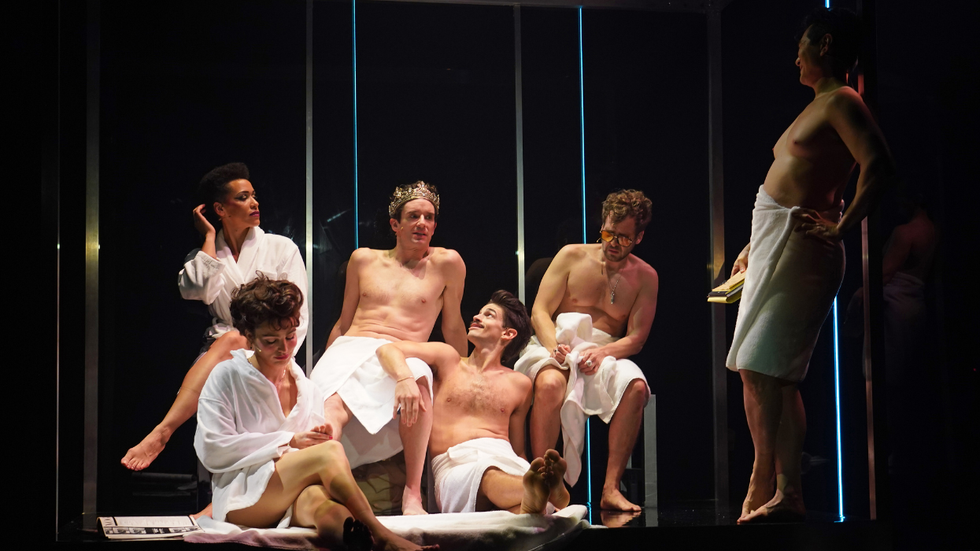How Michael Urie and Lux Pascal prepared for a very queer 'Richard II'
Director Craig Baldwin doesn't see his version of Richard II as a revisionist look at the Shakespeare play, but rather as a reclamation of the queer history already embedded in the material. Being able to shift queerness to the forefront of a play like this, he says, is one of his proudest achievements because it doesn't distort the show's meaning. Rather, it enhances it to emphasize an issue queer people grapple with daily: power. How does one wield power? Who do you have to step on to gain it? And how do you lose power? These are the sorts of topics that Baldwin set out to examine in his new show, which opened at Astor Place Theater on Monday.Many of Shakespeare's works are about the monarchy, but more specifically about how terrible it is to be a king. Richard II is no different; Michael Urie of Ugly Betty and Shrinking fame plays the titular role. The Once Upon a Mattress star was ecstatic to take the helm of this project as the lead because Shakespearean works present epic opportunities for an actor. "Every time I do a Shakespeare play, I think All I wanna do is Shakespeare because its so rich," Urie says. "Theres so much going on, the stakes are so much higher than most other kinds of plays, and you get this incredible work. And with Shakespeare, he creates an engine for you with the language, so if you're in the pocket doing it, it's like you're flying. Its really like a drug." Michael Urie as Richard II in "Richard II" Carol Rosegg To Urie, Richard II is a beautiful role to play because the character is riddled with flaws but eloquent like many gay personas today but this production is set in the 1980s. Baldwin explained that the decision to ground this show in that decade came from a thought experiment: trying to piece together how the world reached today's fraught political moment and he immediately thought of the '80s. "Reagan politics, trickle-down economics, aggressive privatization, deregulation of financial institutions, and the selling off of public housing to real estate developers it was all this leadership that really only served the ruling class or the wealthy," he explains. "The 80s seemed like the perfect place to put this play to talk historically about America and the prequel to now." In this version of the show, with rewrites by Baldwin, Richard II surrounds himself with a sort of "chosen family" of queer entourage. His queen (played by Lux Pascal, who is transgender) is, as Urie describes, one of the most divine and fabulous women in the kingdom a role that Pascal herself deemed a bit uncomfortable to play. When asked where that discomfort is coming from, she said, "I think it comes from my ability to feel worthy of things, I think I'm battling with my imposter syndrome."Pascal is working her way into the entertainment industry, shortly after her brother, Pedro Pascal, found success and ballooned in popularity with big-budget projects like The Mandalorian, The Last of Us, Gladiator II, and Fantastic Four: The First Steps. Around the time that Pedro became a household name in 2023, she finished her MFA program at Juilliard, but she'd already had a few acting projects under her belt on Spanish-language shows in Chile as well as her international debut in Narcos, alongside her brother.But getting to pull on different threads as the queen has been a rewarding process for Lux, she explains. "She's a young queen and was put in that position as a child [similar to her husband]... and the complexity of the circumstances of this character is still there... She was raised with that privilege, but there is a lack of consciousness of what that means." Lux Pascal and Ryan Spahn in "Richard II"Carol RoseggLux empathizes with the character; she recognizes that she is trying to find her footing amidst the chaos of the story and doesn't judge her if she finds herself staying silent or not speaking in some moments throughout the show. "When a character is silent, but it's in the scene, it's not because they don't care. They're silent because there's a choice to be silent," she says.As is with any Shakespeare show, the show is dense and there is a lot to follow, but Urie and Baldwin give the audience grace if they struggle with the material. Urie offers a word of advice: Shakespeare is not meant to be read. It's meant to be spoken or heard. So I always tell people, don't be hard on yourself if you read it and didn't get it. He continues, I absolve you, audience, of understanding every word of it. If you have a thought in your head of I'm not following this, let it go and re-engage. Because if you're thinking, I'm not getting this, you're missing something else."One recommendation he has for audience members who may find themselves a bit lost is to look at him while he's onstage because his character rarely leaves. "They can just look at me," he explains, because while his character is not technically in the scene, his reactions will tell audiences everything they need to know.




